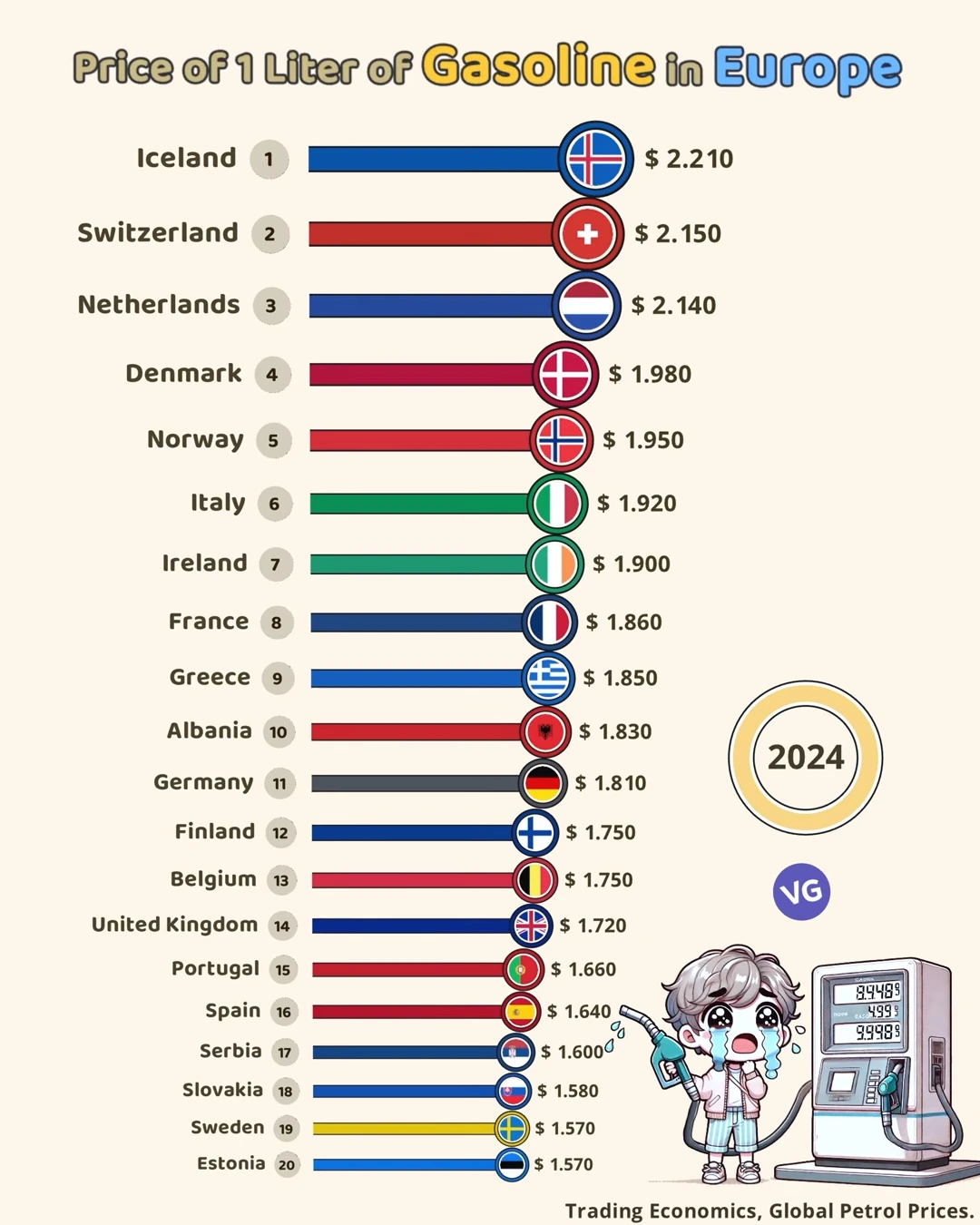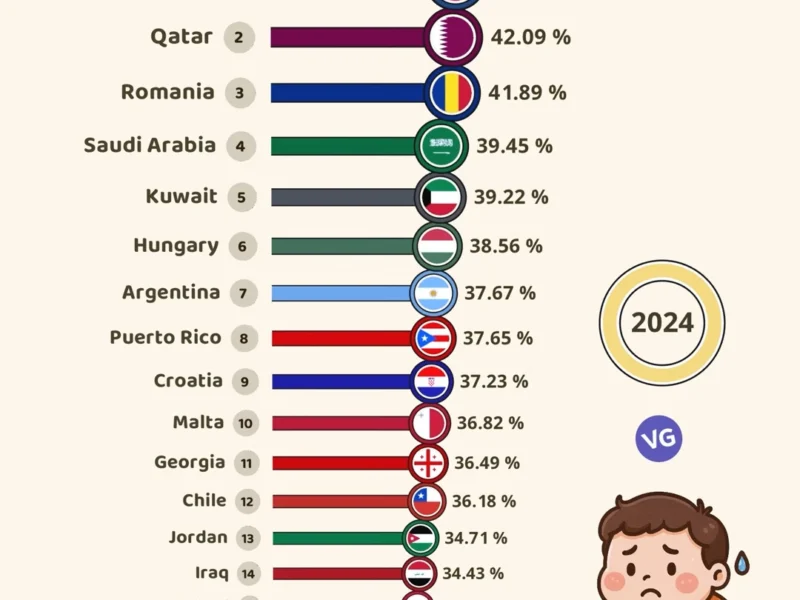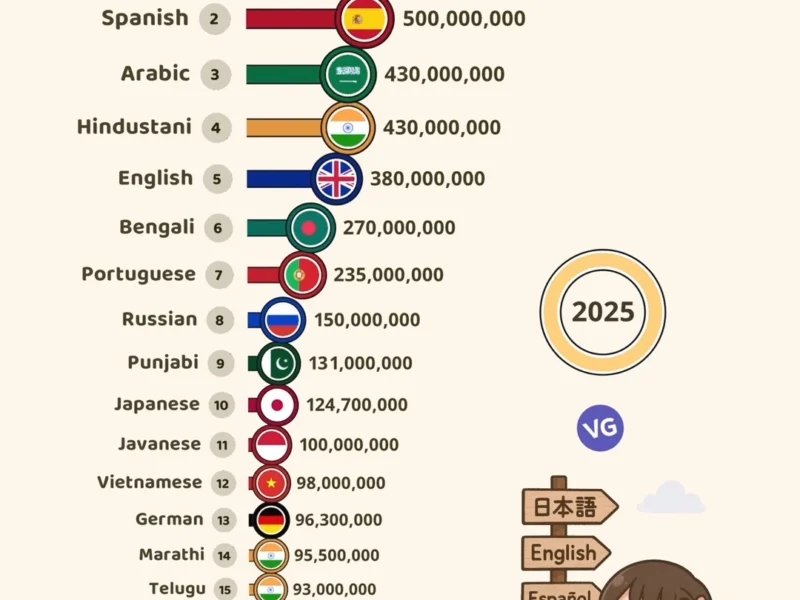Recent data from Trading Economics reveals significant variations in gasoline prices across Europe, with some surprising patterns emerging in different regions. This analysis explores the key trends and factors influencing these price differences.
Price of 1 Liter of Gasoline in Europe (2024)
| Rank | Country | Price (USD) |
|---|---|---|
| 1 | 🇮🇸 Iceland | $2.210 |
| 2 | 🇨🇭 Switzerland | $2.150 |
| 3 | 🇳🇱 Netherlands | $2.140 |
| 4 | 🇩🇰 Denmark | $1.980 |
| 5 | 🇳🇴 Norway | $1.950 |
| 6 | 🇮🇹 Italy | $1.920 |
| 7 | 🇮🇪 Ireland | $1.900 |
| 8 | 🇫🇷 France | $1.860 |
| 9 | 🇬🇷 Greece | $1.850 |
| 10 | 🇦🇱 Albania | $1.830 |
| 11 | 🇩🇪 Germany | $1.810 |
| 12 | 🇫🇮 Finland | $1.750 |
| 13 | 🇧🇪 Belgium | $1.750 |
| 14 | 🇬🇧 United Kingdom | $1.720 |
| 15 | 🇵🇹 Portugal | $1.660 |
| 16 | 🇪🇸 Spain | $1.640 |
| 17 | 🇷🇸 Serbia | $1.600 |
| 18 | 🇸🇰 Slovakia | $1.580 |
| 19 | 🇸🇪 Sweden | $1.570 |
| 20 | 🇪🇪 Estonia | $1.570 |
Northern European Premium
Nordic Region Dominance
Iceland leads the European market with the highest price at $2.210 per liter, followed closely by the Netherlands ($2.140) and Denmark ($1.980). The Nordic countries consistently show higher prices, with Norway at $1.950 per liter, reflecting their strong environmental policies and high taxation rates.
Switzerland’s Special Case
Switzerland, ranking second with $2.150 per liter, demonstrates how non-EU membership doesn’t necessarily mean lower fuel prices. The country’s high living standards and transportation costs contribute to elevated fuel prices despite not being bound by EU energy policies.
Central and Western Europe
Economic Core
The central European economic powerhouses show relatively high but not extreme prices. Germany, Europe’s largest economy, sits at $1.810 per liter, while France maintains a price of $1.860. These prices reflect a balance between economic policies and environmental considerations.
Benelux Variation
Belgium ($1.750) shows notably lower prices than its neighbor Netherlands ($2.140), highlighting how regional pricing can vary significantly even between closely connected economies.
Southern European Trends
Mediterranean Pricing
Italy leads the Southern European region at $1.920 per liter, while Greece follows at $1.850. Portugal ($1.660) and Spain ($1.640) maintain lower prices compared to their northern counterparts, possibly reflecting different economic conditions and taxation policies.
Eastern European Markets
Competitive Pricing
Eastern European countries generally show lower prices, with Slovakia at $1.580 and Estonia at $1.570 per liter. Serbia maintains a competitive $1.600 per liter, demonstrating the generally lower price trend in Eastern Europe.
Key Insights
Price Range Analysis
The price difference between the highest (Iceland: $2.210) and lowest (Estonia: $1.570) is $0.640 per liter, showing significant regional variation. This range reflects various factors including:
- Local taxation policies
- Transportation costs
- Environmental regulations
- Economic development levels
- National energy policies
Regional Patterns
A clear north-south and west-east gradient is visible in the pricing structure, with:
- Northern countries generally showing higher prices
- Southern countries maintaining mid-range prices
- Eastern European nations offering more competitive rates
Future Implications
These price variations have significant implications for:
- Cross-border commerce
- Consumer behavior
- Transportation industry
- Environmental policies
- Economic competitiveness
The data suggests that European fuel prices continue to be influenced by a complex mix of factors, from national policies to regional economic conditions, creating a diverse pricing landscape across the continent.



